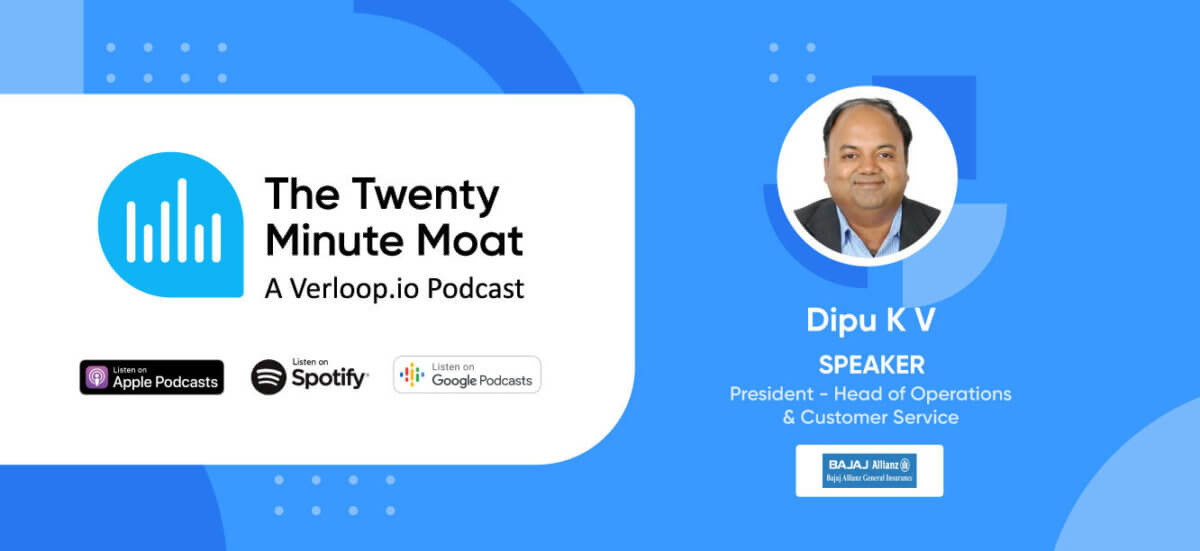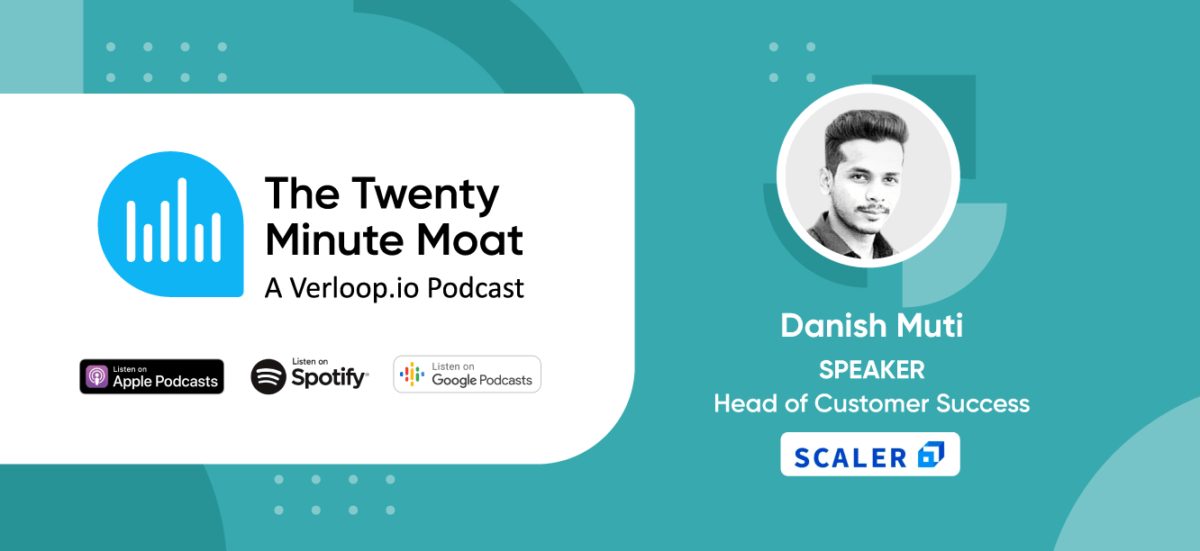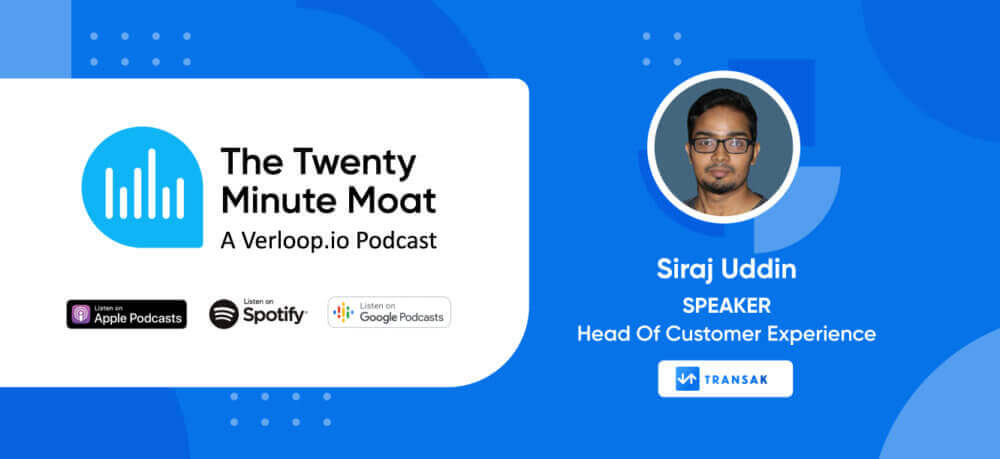Duration 21:01
Guest Speaker
Industry
E-commerce
Bhisham Bhateja is the co-founder of The Man Company, a premium men’s grooming product company. A Business leader with expertise in start-ups, operations, strategy consulting, and India entry consulting across e-commerce, retail, automobile and industrial space, at The Man Company he currently focuses on operational efficiency without compromising on the complete experience. He has also created a strong distribution network of over 20 marquee distributors for the mass market brand of perfumes and deodorants.
We cover:
- What customer support is like at The Man Company?
- Are customers keen on interacting with chatbots?
- What are the magic ingredients that go into making delightful customer experiences?
- Are personalisation and scalability still at odds with each other?
Podcast Transcript
In this customer experience podcast, we have Bhisham Bhateja as our podcast guest and Jude Gerald Lopez as our podcast host.
Jude Gerald Lopez
Welcome everyone to another episode of The Twenty Minute Moat.
I’ve got a very special guest with me on this episode.
We have, Bhisham Bhateja, who is the co-founder of The Man Company.
And has been in the startup space and has also played a huge role in, you know, creating very interesting and delightful experiences for users and, you know, customers of The Man Company.
So I’m also, again, now personally a fan of the brand and, you know, let’s get into the conversation.
And, you know, to begin, I’ll ask, you know, Bhisham to give us a little bit more insight into his role and his journey with the brand as well.
And welcome once again.
Bhisham Bhateja
Ok, thank you.
Hi everyone, I am a Co-founder of The Man Company.
We started our journey in 2015, primarily selling men grooming products, head to toe men grooming products.
Primarily we used to sell through our own website.
And during our six years journey, now we are omnichannel present, across all the possible format of sales, we are present.
[03:11] Jude Gerald Lopez
But, you know, I just wanted to know, like what are those magic ingredients?
You know, at your brand, is able to create a sense of community with your customers.
And, how are you able to do that?
Bhisham Bhateja
OK. So, see, our best… the thing which we follow is honesty.
What we are promising or what we are communicating to our customers, we are delivering that. Either we are overpromising or we are underpromising.
So I think that’s the thing which, during the journey, I have implemented during these six years.
That whatever we promise in our product, we don’t claim something which is not possible only. This is just for the sake of claiming, that we don’t do anything. We treat ourselves as a very honest brand.
Whatever we write or whatever we communicate to our customers, that product will perform in that manner.
I think this is… in one word, this is the answer to your question that this is a secret sauce.
Jude Gerald Lopez
It also builds the transparency, and also helps manage customer expectations.
Bhisham Bhateja
Yeah, yeah, yeah. Couple of our products, you will see natural score 98.3% natural.
Balance 2.7, sorry, 1.7 is some kind of artificial thing.
Jude Gerald Lopez
I mean, this is also the backbone for good customer support at the end of the day, being honest and being transparent.
Bhisham Bhateja
And to the decimal level, it was 93.2 means 93.2.
Jude Gerald Lopez
True
Bhisham Bhateja
Nothing can change it, because that’s a fact.
Jude Gerald Lopez
Yeah, yeah, that’s an objective fact.
Bhisham Bhateja
Yeah, yeah.
[06:35] Jude Gerald Lopez
So, coming to, you know, like… I’m also, you know, quite interested in how customer experience and operations and customer support is..
What are the biggest challenges that you’ve faced in terms of creating, you know, good customer experiences?
And, how have you been solving those challenges?
Bhisham Bhateja
OK. So, see, the biggest challenge in this whole journey is that we are physically not meeting the customer, ok?
And the person who meets the customer for the first time is the courier guy.
And I have no control over that guy.
Even… I use the best of the courier companies, they are also dependent on the last mile delivery people.
And suppose you get a courier, but that last mile guy, for some reason, misbehaved with you or whatever, he… he’s also a human being.
I have no control. That’s the first interaction of the brand with you, and that is a bad experience.
So yeah, these are the challenges. Because if you are a physical customer.
You are coming to my store, then I will make sure and I will train all my people to give you an amazing experience.
But yes, with the digital thing, that is one of the biggest challenges.
Jude Gerald Lopez
Yes.
Bhisham Bhateja
Purchase through social media, or through blogs, or through video content.
We are… publishing our data, our product qualities or tips to grooming et cetera, et cetera.
So we are Interacting with the customer before the purchase.
So, that way we are trying that we should give customer content that he wants to…listen to, hear or read.
Whatever… he wants to see as well as in the language.
My target audience is a defined target audience. So I speak the language they understand.
So that there is better communication between both of us.
Jude Gerald Lopez
I think that’s a very interesting part of the philosophy, right?
If you can empower the customer with the information they need, then they don’t have to come back.
And, you know, raise a ticket.
Bhisham Bhateja talks about issues in customer interaction
I want to point out that the customer care thing comes when there are issues.
Issues could be anything.
Issues could be delivery issues, issues could be my product.
How to use issues? Issues could be pre-purchase. Why should I buy that product?
But during our weekly meetings, we analyze why these queries are coming and what is the root cause?
And we go 2 Steps behind to solve that thing.
Because there are people who say as your business is growing, you have to expand your uh… customer care team.
That not the right way to think. They cannot be proportional. It cannot be proportional.
You have to make… we have to make sure that we… it, and the communication, whatever customer wants to know, their pre-purchase, during the purchase, and post-purchase.
When I say post-purchase, there are two things.
After buying, it reaches customers place. And once, customer has opened the product, then also what cust…, how to use and everything are in place?
So that customer does not feel, at any point of the time, I did not find this information during my whole journey, then I have to call you.
So we try that we solve all the problems in a manner that we get very limited number of tickets.
And we are still, every day, we are learning and we are solving those problems.
Jude Gerald Lopez
Yeah. I think that’s a very interesting point that you’re making.
Improve the product and then…
Bhisham Bhateja
No. The complete experience.
[14:43] Jude Gerald Lopez
What’s… what’s the customer support team like at The Man Company?
And, you know, when you were growing it, and you know, building the support team, like what was the kind of priorities?
Bhisham Bhateja
As I, as I told you I… I… we are not a firm believer of… that suppose, I am growing by 20% month on month, or 10% month on month, my call centre team should also grow by…
So we don’t have that philosophy.
Ok. Whatever percentage I’m growing, no, that’s not right.
We make sure that whatever queries are there.
The kind of queries, they are coming.
How can we mitigate them? For example, there was this time, when we used to get lot of queries regarding, where is my courier?
It’s not delivered. Though we are delivering on time, everything.
Like, I get the order… every day, whatever order comes, by 4:00 o’clock we deliver, we ship it the same day.
For a few areas, we are doing express deliveries. So all those metrics are right.
But if customers are raising queries.
So we found a mechanism, made a process that this is how we will communicate, and that’s how we reduced the delivery queries. It’s just an example.
Jude Gerald Lopez
Ok.
Bhisham Bhateja
Ok, during the Valentine’s, or Father’s Day, because a lot of gifting have happens. And we have to make sure that we give them extra information.
The frequency of information increases.
So that they are patient enough. That the gift will reach on time.
We give the customer what he’s expecting during the journey.
So that’s how we are building the team. I won’t say team, building the process.
Jude Gerald Lopez
It’s the processes that drive the team, yeah.
Bhisham Bhateja
Yes, I’m building the process.
As in that process, if we require X number of people, we do.
But we don’t believe in just getting people and that’s a traditional way of call centre works, no?
I’m literally against that. We try to invest in the process. And that’s how we are building it.
Jude Gerald Lopez
And create those delightful experiences.
Bhisham Bhateja
Yeah, that’s the main agenda.
Jude Gerald Lopez
Yeah, right.
Bhisham Bhateja
Getting increasing the headcount is not the agenda.
Jude Gerald Lopez
Yeah. I mean it’s counterintuitive.
Bhisham Bhateja
And when even we to the whiteboard to make that process, whatever… things keep going wrong.
Every week, there is a new problem, a new challenge.
But when we make the process, we don’t have to increase the headcount.
So that’s about it.
[17:41] Jude Gerald Lopez
Going, like, you know, I…I wanted to also, you know, ask a little bit on where do you see, you know, customer support as a space for, you know, for various brands?
And now, say, for example, an e-commerce platform, how do you see this space evolve in the coming year?
You know, the greater amount of automated processes and, I wanted to get a, take on how are customers responding to that.
Bhisham Bhateja
See, So there are couple of queries. Which, just for example, there’s a courier query.
When will I get it? A customer is not expecting a human touch to it.
And the other thing which has evolved during this, say, would say past 10 years, when the internet journey has started in India.
Customers are also mature enough to understand where they need a human touch.
And where this information, whatever is required, is fine. And the other thing is that customer…
Customers are also happy not to talk to somebody because they are getting so many customer care calls.
Cold calls during the day that nobody wants to talk to somebody.
And for a problem which is solvable while just giving information.
Suppose you order a pizza. It’s just, you see on the app no, that this is my order. It has reached here, so that’s the same thing.
Bhisham Bhateja
That time, you don’t feel like talking to somebody, because you can see and that information is almost accurate because that’s a past experience.
The same thing, happens when these queries are very tactical.
Very tactical queries, that time, I think, customers have also accepted and they are also mature enough to understand the whole technology that here the human touch is not required.
Jude Gerald Lopez
Do you think with the, conversational AI and automatio, do you think it’s moving towards a stage where these processes, these automated processes are going to be exhibiting higher-order skills like empathy?
Bhisham Bhateja
I’ll rephrase the question.
That, with technology improving, will technology replace the human agents?
Jude Gerald Lopez
Yeah, or will it start emulating a little bit more, the empathy which humans can sometimes, provide to a conversation.
Bhisham Bhateja
See, again, I would say, the problem, the query of the customer will decide what kind of service he needs.
Do you understand? Suppose you are in a hurry. And you go to McDonald’s for or any QSR quick service restaurant, there, you are not expecting any service just the agenda is to pick up that thing and just move.
And if you go to a fine dining. There, you need a different kind of service.
Yes, the technology will play a much bigger role in solving this kind of problems.
And you will, you will be seeing a lot of vernacular stuff also happening now.
Chatbot is, I think, one or two languages, but, you will see it going to all the languages.
Bhisham Bhateja talks about the role of machine learning
And slowly, with the learning, that… because there’s a machine learning is there, they will, uh…uh..the… the machine will learn on its own also.
And emotional, I think that emotional thing cannot come with a chatbot thing. It will never come, because that’s a machine.
But, yes, technology will play a very big role in this customer care industry, but they cannot replace a human agent.
Because there will be few queries across industries.
Not my industry, across the airlines, you take automobile, anywhere, you have to have humans because the gravity of the problem is different.
So, if the gravity is more than yes, humans are required to solve that problem.
Because there could be a situation where there is no solution to track that problem with the agent as well as with the chatbot.
But humans can pacify the customer.
Jude Gerald Lopez
Customers are venting sometimes and they want a listening ear that can say, ok, I relate to this problem..
Bhisham Bhateja
Yeah
Jude Gerald Lopez
And we can figure it out together.
Bhisham Bhateja
Yeah. Because, at times we also get, as founder, I may get some call of something where I have no-fault.
My team has no fault or something. For example, you’ve ordered on Saturday, and Sunday is a Valentine’s Day, and it will never reach.
And if we say we need three days. But customer can vent it out.
So, they need a ear and we have the ears.
Jude Gerald Lopez
It’s been quite interesting.
You know, getting that inside philosophy on, you know, how these delightful and well thought out experiences for customers are created.
Bhisham Bhateja
In those situations we only, say, sir, what can I do to help you now?
Jude Gerald Lopez
Yeah.
Bhisham Bhateja
This has happened. Valentine’s Day has crossed. I can’t make sure that it reaches Guwahati on time.
Jude Gerald Lopez
Yeah.
Bhisham Bhateja
Because I’m present somewhere or other, I am present in some format in Guwahati.
Bhisham Bhateja
And I try, Ok, sir, that is not available.
Can I give you this thing? So, those calls a human can take.
Jude Gerald Lopez
Yeah
Bhisham Bhateja
You need to try to solve. So, that human is required, depending on the gravity of the problem.
Jude Gerald Lopez
I wanted to, like, you know, come to one more question.
That, in the customer experience, in customer support space, there’s always this dilemma. Or there is this huge gap between personalized experiences and scalability.
So highly custom, highly curated experiences, sometimes it will not necessarily be scalable. What’s your take on that?
Bhisham Bhateja
See, with the technology, this personalised thing can be achieved at any scale.
Like, suppose, you have a query.
You raise the ticket, with the technology, I will come to know about your name, phone number, your location, your last order, everything, and the chat bot will be smart enough to talk to you.
Sir, is anything you bought last time, I want… you want help on that product?
How are you using that particular cream? I believe you like the fragrance.
Those kind of things can incorporate in the chatbot.
And this is happening and..though it will take some time to evolve, but yes, this is happening.
With your order history, because your order history can be combined.
Can be combined with… on the Facebook, if you’ve seen something or write something you know, any of our products with the kind of customer query you raised.
Like two months back, all those things can be collated and chatbot can talk to you.
Jude Gerald Lopez
Yeah.
Bhisham Bhateja
This is 100% doable at any scale and I don’t see a challenge in this.
Yes, it will take a lot of time because.
Whatever chatbot platform…anybody is using, it has to be integrated with everything.
And the only thing is that the person is also using the same phone number or same email ID across, so that we integrate everything around it.
So that way, I think, personalization with any scale is possible.
Jude Gerald Lopez
Perfect.
I mean, there’s a lot of insights for all our listeners and viewers of the podcast on, you know, what to focus on?
And what are the things that fall into place if your priorities are right.
In creating those, you know, delightful experiences that create a, you know, a sense of trust and love for users.
So it’s been brilliant talking to you Bhisham.
It’s been brilliant listening to your take on things and your philosophy and the kind of journey The Man Company has been on.
So, thank you so much for taking so much time and being on The Twenty Minute Moat.
Bhisham Bhateja
Thank you, thank you very much.
I hope all of you… everybody will gain something out of this.



